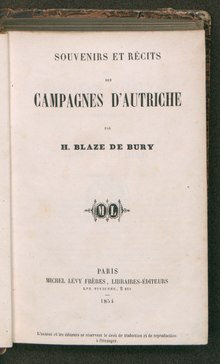Henri Blaze de Bury
Ange Henri Blaze, Baron de Bury (born May 19, 1813 in Avignon , † March 15, 1888 in Paris ) was a French author , poet and literary , art and music critic .
life and work
Henri Blaze came from an old noble family of the County of Venaissin , was the son of the composer and music writer François Henri Joseph Blaze (called Castil-Blaze; * 1784, † 1857) and was called Blaze de Bury after his mother's English family name. He studied at the Collège Bourbon in Paris and participated in his father's adaptation of Don Juan for the Parisian Opera. With the comedy of verse Souper chez le commandeur , he first appeared as a poet in the Revue des Deux Mondes in 1834 . From 1834 to 1851 and from 1864 to 1883 he was one of the most important contributors to this magazine.
The influence of the Romantics determined Blaze de Bury to study German literature . He had embarked on a diplomatic career early on and stayed in this capacity at the court of Weimar from 1839 . Here he created a French translation of Goethe's Faust (1840). He kicked u. a. with the Chancellor Friedrich von Müller in friendly contact, as well as with the Grand Duchess, to whom he dedicated his French Faust . This work, which appeared in its 14th edition in 1880, gained wide circulation. Two splendid editions came out, illustrated by Tony Johannot (1847) and Adolphe Lalauze (1879).
Since 1844 Blaze de Bury was with the author Marie Pauline Rose, geb. Stuart married. The couple disapproved of Napoleon III's rule . and lived in exile in Germany from 1851 to 1864.
The contributions Blaze de Bury published in the Revue des Deux Mondes, some under the pseudonym Hans Werner , had the merit of imparting knowledge of the contemporary German poetic literature to the French. The writings Les poèsies de Goethe (1843; 2nd edition 1862), Écricvains et poètes de l'Allemagne (2 vols., Paris 1846), La nuit de Walpurgis (1850), Les écrivains modern de l ' emerged from these studies . Allemagne (1868) and Les maîtresses de Goethe (1873). Through his repeated stays in Germany Blaze de Bury had increased his ability to judge German intellectual life.
He was also a popular music writer. Among other things, he wrote the libretto for Meyerbeer 's Goethe's youth . From 1864, under the name of F. de Lagenevais, he worked as a music critic for the Revue des Deux Mondes and wrote the works Les musiciens contemporains (1856), Rossini et son temps (1862), Meyerbeer et son temps (1865) and Goethe et Beethoven (posthumously 1892).
Blaze de Bury used to show a decidedly conservative outlook and fought hard against Wagner's influence, which he later treated with less prejudice in his Musiciens du passé, du présent et de l'avenir (1880). In Mes études et mes souvenirs: Alexandre Dumas, sa vie, son temps, ses œuvres (1885) he erected a memorial to his deceased friend Alexandre Dumas . He died in Paris on March 15, 1888 at the age of 74.
Other works (selection)
- Rosemonde, legend , 1841
- Poésies complètes , 1842
- Un mois à Venise , 1850
- Souvenirs et récits des campagnes d'Autriche , 1854
- Episode de l'histoire du Hanovre, les Kœnigsmark , historical study, 1855
- Intermèdes et poèmes , 1859
- Hommes du jour , 1859
- Le Décaméron , comedy in one act and one verse, performed in 1861 at the Théâtre National de l'Odéon
- Les salons de Vienne et de Berlin , 1861
- Le chevalier de Chasot, mémoires du temps de Frédéric le Grand , 1862
- Les bonshommes de cire , 1864
- La légende de Versailles , 1870
- Les femmes et la société au temps d'Auguste , 1875
- Tableaux romantiques de littérature et d'art , 1878
- Dames de la Renaissance , 1886
literature
- Henri Blaze de Bury . In: Meyers Konversations-Lexikon . 4th edition. Volume 3, Verlag des Bibliographisches Institut, Leipzig / Vienna 1885–1892, p. 10.
| personal data | |
|---|---|
| SURNAME | Blaze de Bury, Henri |
| ALTERNATIVE NAMES | Blaze de Bury, Ange Henri; Blaze, Henri |
| BRIEF DESCRIPTION | French author, poet and literary, art and music critic |
| DATE OF BIRTH | May 19, 1813 |
| PLACE OF BIRTH | Avignon |
| DATE OF DEATH | March 15, 1888 |
| Place of death | Paris |

